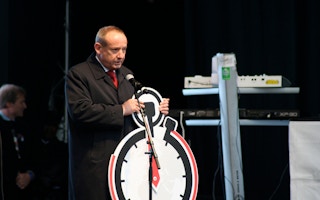The former head of UN climate policy-making says he hopes the world’s spies are busy eavesdropping on the negotiators at the COP21 climate summit in Paris.
Yvo de Boer, previously executive secretary of the UN Framework Convention on Climate Change (UNFCCC), was commenting on reports that some countries’ negotiating teams are so afraid their offices are bugged that they will speak only outside, in the chill open air.
De Boer steered the UNFCCC through the 2009 climate conference in Copenhagen, and said he had been extremely grateful for advice from “the intelligence gatherers there” about a possible demonstration against world leaders − including Libya’s then leader, Colonel Gaddafi − which could have ended in violence.
“So, yes, I hope Big Brother is watching things here,” he says. “I wouldn’t be surprised if the offices are being bugged. If we’re getting to the point where climate negotiators are being bugged, it’s a sign that we’re getting somewhere.”
Speed of increase
And de Boer does think the meeting is likely to succeed in forging a climate treaty. He says: “Agreed, Paris won’t keep global warming below the 2°C safety level: it will merely slow the speed of its increase. But it marks the point when the world finally moves from negotiation to implementation − albeit on a very modest scale.”
Now heading the Global Green Growth Institute, based in South Korea, he believes that finance is the biggest issue at the talks.
“
I wouldn’t be surprised if the offices are being bugged. If we’re getting to the point where climate negotiators are being bugged, it’s a sign that we’re getting somewhere.
Yvo de Boer, former executive secretary of the UNFCCC
“The process tends to talk about money in the stellar abstract − in trillions and zillions,” he says. “We need to leave Paris saying the US$100 billion promised annually by 2020 as climate-change aid from rich to poor countries is a floor, not a ceiling, and linking money to specific action.”
Many NGOs and campaigners at the talks are worried that time is very short for resolving the outstanding issues.
The development charity Christian Aid says: “Right now, the text is unworkable as it doesn’t include a clear commitment to provide finance to help vulnerable countries adapt to climate change.
“The uncertainty around that is eroding trust, which will be needed when ministers take over the negotiations on Monday. In these final hours before Saturday’s deadline to deliver a new text that ministers can work with, delegates need to provide a clear way forward.”
Other issues still causing concern include a long-term collective goal, loss and damage (the possibility of attributing climate change to a specific event), and an extended donor base for providing finance.
Verge of breakthrough
Yet even normally sceptical COP attenders think Paris is on the verge of a breakthrough. One said: “I watched some demonstrators outside chanting: ‘End fossil fuel subsidies!’ Then I came in here to a briefing. One of the speakers was a banker. He said: ‘We need to end fossil fuel subsidies.’
“This is capitalism solving climate change. It’s happening because China has recognised the market opportunities in moving to a renewable-fuelled society. Paris is a tipping point.”
But not everyone is certain that triumph is there for the taking. “There are some very nasty things going on here,” said one analyst. “There’s a lot of bullying, for example, of some of the small island states.
“There may be a deal, but there’s so much still to resolve that it’s not at all certain. Yes, Paris is a tipping point. And it can tip either way.”
Some speak of “unstoppable momentum towards a significant outcome”. Others invoke the unstoppable momentum of natural forces, and question whether the Paris agreement − however superlative it is − may have come decades too late.





















